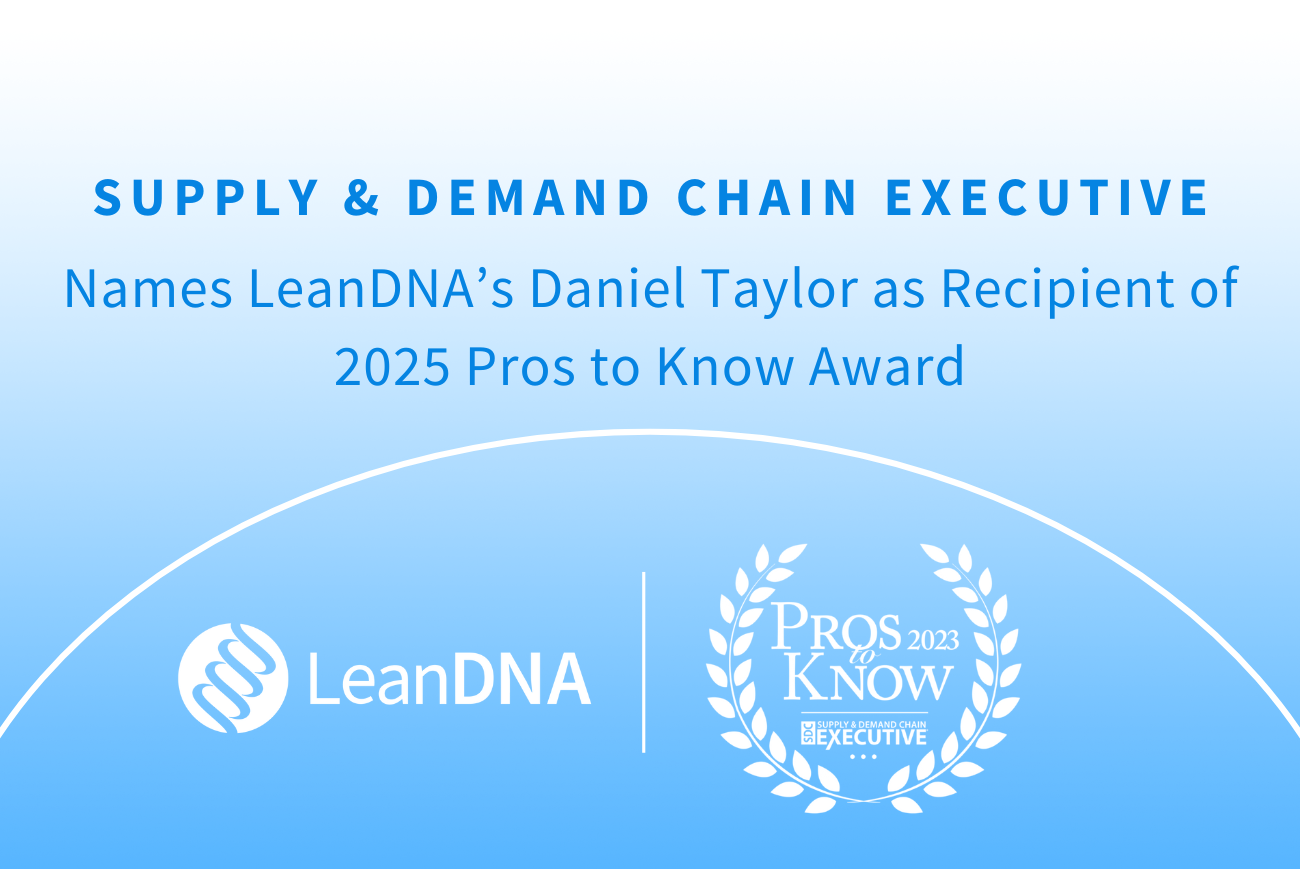In today’s fast-paced and ever-changing global market, supply chain adaptability has emerged as a superpower. In our recent webinar, Adaptability: The Supply Chain Superpower - Proactive Decisions to Mitigate Risks, Dustin Dunn, Inventory and Technology Leader of Global Supply Chain at Spirit AeroSystems and Daniel Taylor, VP of Customer Success at LeanDNA, shared insights into navigating the challenges of supply chain management and harnessing adaptability to thrive in uncertain times.
Click here to watch the full on-demand webinar or keep reading for the top three webinar takeaways.
#1. Accept Disruption is Coming and Harness Your Data to Mitigate Risks
Executives in the supply chain are proactively planning ahead to mitigate risks posed by various disruptions such as supply shortages, natural disasters, cyber attacks, and potential public health crises. This forward-thinking approach is driven by the recognition that unforeseen events can significantly impact supply chain operations and profitability.
Barriers to Using Real-time Data
Despite the growing awareness of the importance of real-time data in supply chain management, numerous barriers hinder its effective utilization. According to survey responses, 96% of executives encounter obstacles such as cost, skills, and technology limitations, preventing them from leveraging real-time insights to inform decision-making. Consequently, a lack of predictive visibility into supply and demand leaves organizations vulnerable to disruptions, with 92% of executives admitting to making blind decisions due to this deficiency.
Dustin Dunn emphasized the critical role of proactive decision-making in mitigating supply chain risks and he outlined three fundamental elements necessary for success:
"There are three key fundamentals that are a progression of each other. It starts with building a comprehensive high-performing team, then transitioning into providing that team with the necessary resources and tools for success. Lastly, it's about encouraging and supporting your team to behave proactively."
Team Empowerment:
It’s important to assemble the right team and align their skills and talents with organizational goals. Clear expectations and open communication channels are vital in fostering a collaborative environment where ideas can be debated, and strategies can be adapted as needed.
"As leaders, it's really your job to make sure you're putting the right team members in the right position to be highly successful. Open up communication, debate ideas, and run a democratic team where people can share ideas freely."
Providing the Right Tools:
Once the foundation of a capable team is established, providing them with the necessary tools and resources becomes imperative. Empowering and supporting the team instills trust and confidence, enabling them to make autonomous, proactive decisions.
Proactively Forecasting Supply and Demand:
There’s a need for strategic forecasting in order to anticipate supply and demand fluctuations. By investing in technologies, simplifying processes, and maintaining global alignment, organizations can effectively mitigate risks and optimize their supply chains.
#2. Streamline Buyer Processes to Ensure Supply Chain Resilience
Quickly identifying areas of risk and opportunity within your supply chain ecosystem is key. It’s important to understand that success hinges on the ability to discern where risks exist—and equally crucial—where they do not.
To address these challenges, Spirit AeroSystems has implemented a multifaceted approach:
Investment in Technology:
Recognizing the potential of technology to alleviate administrative burdens, Spirit AeroSystems has implemented cutting-edge solutions like LeanDNA. By automating manual tasks and enhancing data analytics capabilities, technology plays a pivotal role in streamlining buyer processes and improving efficiency.
"LeanDNA helps us to consolidate different business processes and governance, simplifying the daily cadence of jobs and guiding our professionals with a single source of truth."
Process Simplification:
Simplifying and optimizing existing processes are fundamental to enhancing buyer efficiencies. Spirit AeroSystems has undertaken rigorous evaluations of their operational workflows, identifying areas to streamline and improve.
"We took a survey of the organization early on, and not only the supply chain organization but also our logistics, quality, and manufacturing organizations. We spent a lot of time road showing what is automation and how we can best implement and deploy those throughout different areas of our business."
Based on user feedback and insights from professionals in their respective disciplines, Spirit AeroSystems identified tasks that were redundant, administrative, and not adding real value to the business. These tasks were aggregated into a comprehensive list to be ranked, prioritized, and worked on over a four year period.
This iterative process involved annual roadshows to gather new ideas, brainstorm improvements, and reassess the value of existing automations. This approach ensured that the implemented changes were continually delivering the expected benefits and were being used as intended.
Adaptability and Innovation:
In this rapidly evolving industry, adaptability is key to staying ahead of the curve. Spirit AeroSystems maintains an open-minded approach to innovation, constantly seeking out new solutions and technologies. By embracing change and proactively exploring opportunities for improvement, the company remains agile and resilient in the face of uncertainty.
"We have to be adaptive to change and open-minded, fostering an environment that allows and promotes change. This mentality offers significant opportunities."
Spirit AeroSystems has adopted various technologies to enhance efficiency, with LeanDNA being a notable example. This technology consolidates diverse business processes and governance activities, effectively reducing noise within their ecosystem. By providing a single source of truth, LeanDNA has streamlined daily tasks for professionals, simplifying their workflows and aggregating activities into just a few essential tools. This integration has significantly improved operational efficiency across the organization.
By continuously exploring new solutions and embracing change, the company maintains its agility and resilience. This strategic focus on adaptability and innovation allows Spirit AeroSystems to efficiently mitigate risks and seize opportunities, fostering long-term success.
#3. Simplify and Standardize Multi-Site Operations to Achieve Consistent, Predictable, and Optimized Outcomes
Operating across multiple global sites introduces a myriad of complexities, including differences in operational practices, languages, ERP systems, even holidays. To navigate the intricacies of global operations, Spirit AeroSystems has implemented several strategies that have been successful:
Leveraging Common Suppliers:
Identifying and leveraging common suppliers across different regions facilitates standardization and consistency in the supply chain. By consolidating supplier relationships where feasible, Spirit AeroSystems minimizes complexities associated with managing multiple vendors and enhances operational efficiency.
Standardizing Tools and Processes:
Standardization of tools, technologies, and processes serves as a cornerstone of global alignment. Spirit AeroSystems emphasizes the benefit of adopting uniform operational practices and technologies across all global sites to ensure consistency and compatibility in workflows. Dustin pointed out there are currently only two technologies used globally across Spirit AeroSystems, and LeanDNA is one of them.
"LeanDNA is one of the few technologies used globally across Spirit AeroSystems. LeanDNA has been an excellent partner with a technology that can be present in different ERP systems, and is actually in very usable consumable condition for global teams.”
Communication and Collaboration:
Effective communication is paramount in fostering alignment across sites. Prioritizing transparent communication channels and collaborative platforms facilitates knowledge sharing and decision-making across global teams.
"Building relationships and over-communicating across sites is crucial. The more connected we are, the smoother the transition into common technology and practices becomes. Let technology indicate where things are going well and where they are not, so professionals can focus on solving the right problems.”
These takeaways underscore the importance of adaptability, strategic planning, and leveraging technology to enhance supply chain resilience and efficiency. By empowering teams, embracing proactive decision-making, and leveraging technology, organizations can navigate disruptions effectively and emerge stronger and more adaptable.
Want a deeper dive into supply chain adaptability? Watch the full webinar on-demand.
Ready to learn more about how LeanDNA can help your supply chain teams attain inventory excellence? Sign up for a demo.



